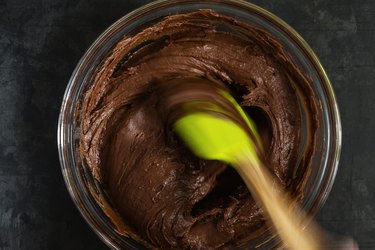
Mixing and beating in baking are two techniques that help create different textures. The former is about blending ingredients, whereas beating makes them very smooth. Choosing one over the other depends on the recipe and the consistency you aim for.
Tip
Mixing simply combines ingredients together, while beating makes them smoother and adds air bubbles.
Video of the Day
Beating in Baking Recipes
Both baking techniques are used to combine wet ingredients with either wet or dry elements. Mixing eggs is an example of mixing wet ingredients. If you want to make scrambled eggs, you crack the raw material into a bowl. To combine the egg and yolk, you can beat them together with a fork.
Video of the Day
When you're baking a cake, you'll need to beat the batter before putting it into the oven. To do so, you'll mix the flour and other dry ingredients with wet ingredients, such as eggs and oil or butter.
Read more: Pumpkin Chocolate Chip Bundt Cake
Whenever you're beating the ingredients together, you're adding air. This process is what transforms eggs and sugar into a meringue, according to the Institute of Food Science and Technology. The foamy and light texture is created by whisking the two elements together, which creates tiny air bubbles.
To add air to a mixture, you need to move quickly. If your baking recipe asks you to beat something, it means that you should move fast and whip the ingredients together. Mixing, on the other hand, doesn't require speed.
The air you add to your baked goods during the beating process contributes to the overall volume of food, explains an article from the University of Kentucky Cooperative Extension Service. These tiny air bubbles expand as your food is baking in the oven, which makes it light and fluffy.
Mixing Ingredients Together
When you're mixing wet and dry ingredients, you can move slowly. If you're making brownies, for example, you'll have to combine the flour and other dry ingredients with wet ingredients like eggs and oil.
To mix these wet and dry elements, you can use something as simple as a spatula or something as complex as an electric mixer. This time, you're not trying to add air bubbles — you simply want everything to blend together.
The University of Minnesota defines mixing as a stirring technique and beating as rapid mixing. That's because the latter is an attempt to change the ingredients themselves by adding air, whereas mixing is just a method used to get all the ingredients together.
Whether you're beating or mixing, the equipment you use is important. According to the Culinary Institute of America, there are various pieces of equipment you can use to combine ingredients. Popular instruments include spoons, electric mixers and whisks.
Mixing and Beating Methods
The tool you pick should be appropriately matched to the job you're doing. If you want to beat eggs, for example, you don't need an industrial-sized electric mixer. Chances are that a fork will get the job done without splashing eggs all over the place. It's also easy to move a fork quickly to beat the eggs together.
Read more: California Scrambled Eggs and Avocado
Whisks are a useful tool for lightly beating something, says an article from the esteemed Auguste Escoffier School of Culinary Arts. Think of light foods, such as a meringue, where you want to create a foam, but the ingredients aren't very heavy.
Some recipes are simple enough that you can get your hands in there and mix things up without any equipment. However, if you're going to do so, be sure to wash up before. The opposite end of the spectrum would be an electric mixer, where you barely have to move a muscle.
Electric mixers are useful for mixing large amounts of ingredients or when preparing multiple batches of a certain type of food. You can also beat some foods with electric mixers since most of them have a variety of speed settings. Mixing would use a slower speed, while beating is performed a lot faster.
- Auguste Escoffier School of Culinary Arts: "When to Use a Mixer and When to Use Your Hands"
- Culinary Institute of America: "Culinary Terms"
- University of Minnesota: "Glossary of Cooking Terms"
- University of Kentucky Cooperative Extension Service: "Quick Breads"
- Institute of Food Science and Technology: "Raising Agents: Physical"